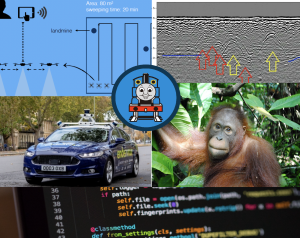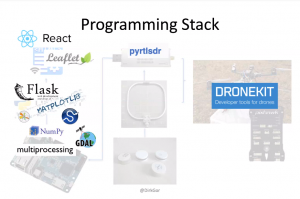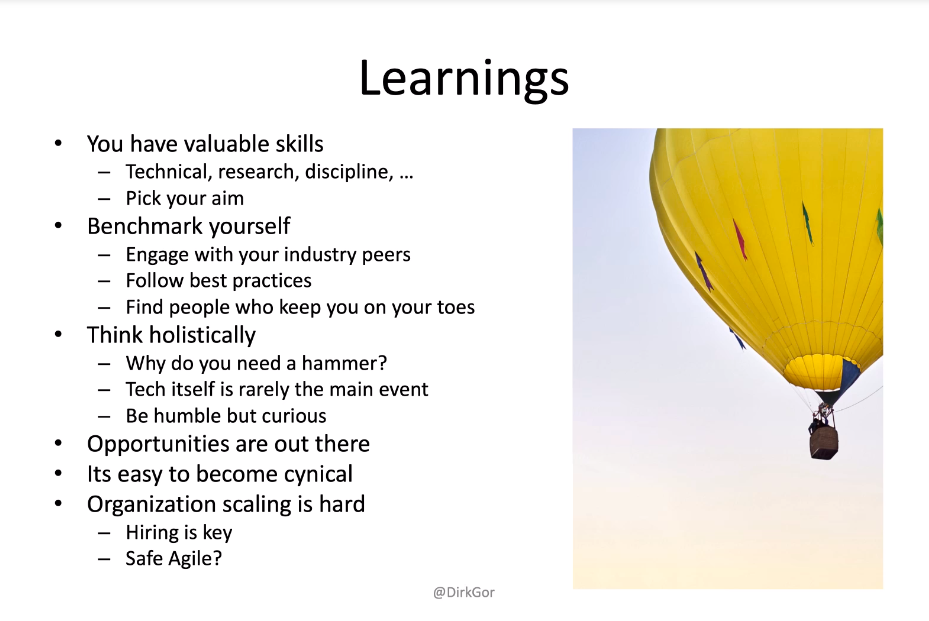Dirk Gorissen is one of the board members for our CDT-NGCM Strategic Advisory Board and delivered a virtual seminar to the NGCM cohorts and the faculty at large, giving his insight into the use of technical skills to benefit society in various ways. By presenting work undertaken throughout his career, Dirk showed us how best to be effective in applying these skills to solve complex problems that are important to us.

Dirk introduced himself as one with an initial academic experience similar to the attendees, with degrees in computational science and AI and a PhD in computational engineering. After working with various industrial partners, a want to learn more about society and how to benefit those in need left Dirk seeking events such as hackathons, where attendees collaborate and investigate the data of charities or other non-profit organisations. In Southampton, for example, the University of Southampton has recently hosted a DataDive, a hackathon event organised by DataKind. SoMakeIt, a non-profit MakerSpace in Southampton, is a community-led environment where knowledge and tools are shared to encourage accessible collaboration in a social environment.
After lauding the usefulness of hackathons and collaborative events, Dirk introduced some of the problems that he would be describing in his talk. Over the course of the hour, we heard of projects that Dirk had undertaken in tandem with various political initatives around the globe. One such project was to set up an open data interface to increase access to the Tanzanian population. They had access to a dataset of 75000 water points, with their locations, type and status logged. With only 54% of water points operational, and no way to update this data, Dirk and his team sought to improve on this by developing an interface to connect citizens to local government. This allowed reporting on water points to identify civil maintenance, for example, and was deployed in a few months to other African nations. However, the complexities of the problem itself as well as socio-political dynamics made it difficult to sustain the project. Although the long-term objective was not met, the project brought awareness to the local community and government, and Dirk presented critical lessons from this case study; the importance of properly interpreting your data and not taking it at face value and incorporating the wider regional context of the problem chief among them.

The loss of the rainforest habitat in Indonesia following development of palm fields or logging is central to the reduction of Orangutan populations in the area, and they are often found adrift and injured. The monitoring of these Orangutan populations is a significant task that is very human intensive and challenging, and provided the basis for another of Dirk’s projects. Through a significant testing and development program, monitoring capabilities that included the use of drones with bespoke hardware and software were introduced into the region. Testing is often a time-consuming phase; three seperate drone setups were tested before the final design. Implementing the drone monitoring was promising and successful in cases, although when reflecting on whether the project met it’s overall goals and whether he has succeeded in “being useful”, Dirk acknowledged the wider issue of habitat destruction and the various difficulties faced in practice. The experience in itself was useful, however, as Dirk passed on the importance of testing, perseverance and managing your expectations when tackling such problems.

Finally, the talk ended with Dirk giving details of his recent work at Oxbotica, who implement many autonomous sensor systems. Other useful lessons, such as the importance of good code hygiene, rigorous testing and comprehensive documentation for working around bureaucracy and other issues within private institutions. Overall it was an insightful and inspiring seminar, with Dirk’s passion for providing a positive impact by working to solve complex, global problems shining through.
Written by James Waters
